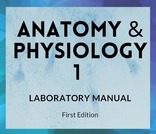
Laboratory manual for undergraduate Anatomy & Physiology 1
- Subject:
- Anatomy/Physiology
- Biology
- Health, Medicine and Nursing
- Material Type:
- Activity/Lab
- Reading
- Teaching/Learning Strategy
- Textbook
- Author:
- Julie Robinson
- Date Added:
- 06/05/2021

Laboratory manual for undergraduate Anatomy & Physiology 1
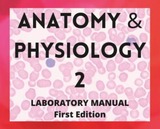
Laboratory manual for undergraduate Anatomy & Physiology 2

Lab Reference to accompany Openstax Anatomy & Physiology.
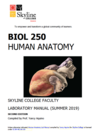
This resource is a human anatomy lab manual compiled of OER resources from OpenStax, independent faculty authors, and other OER resources. It contains 23 wet lab activities which may be revised/remixed as needed.
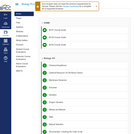
This lab manual is designed to support classrooms without specialized lab equipment. Recommended as a supplement to the Blue Mountain Community College adaptation of OpenStax Concepts of Biology: Concepts of Biology, available at https://www.oercommons.org/courses/concepts-of-biology-2
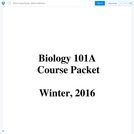
Lab Manual for BIO101 at Mt Hood Community College. The associated textbook is available at https://openoregon.pressbooks.pub/mhccbiology101/
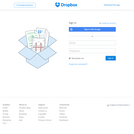
Lab Manual for BIO102 at Mt Hood Community College. The associated textbook is available at https://openoregon.pressbooks.pub/mhccbiology102/
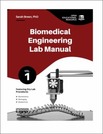
The lab manual was written as the first installment that coincides with two lab courses taught at the University of Oklahoma (BME3171, BME3181). These courses are designed to provide Biomedical Engineering students with lab skills and experience in biomedical engineering research and clinical techniques. This manual is used with BME3171 Lab 1 and the following topics are covered in this lab manual; functional human models, musculoskeletal lever systems, bioimaging (ultrasound), bioelectricity (electromyography), & uni-axial testing.
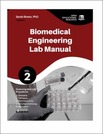
The lab manual was written as the second installment that coincides with two lab courses taught at the University of Oklahoma (BME3171, BME3181). These courses are designed to provide Biomedical Engineering students with lab skills and experience in biomedical engineering research and clinical techniques. This manual is used with BME3181 Biomedical Engineering Lab 2 and the following wet lab topics are covered in this lab manual; bioimaging, cell culture, tissue engineering, live-dead and DNA assays.
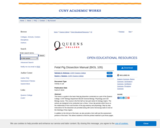
This book is a guide to the basic fetal pig dissection conducted as a part of the Queens College, CUNY Biology Department Bio105 General Biology: Physiology and Cell Biology course. This course is the first half our two-part series for biology majors. The actives are designed to be conducted over a three- 3-hour lab periods which focus on the relationship of form and function of the pig anatomy and physiology. Step by step instructions for the dissection are provided along with some microscopy tasks to look at the histology of key organs.
In addition to the full text of the book, we also provide a form with just the assessment portions of the book. This allows students to limit the printed material to just those pages.

A compiled OER Lab Manual for use in the General Biology I course for Biology Majors (BIO 181) at Mohave Community College. The material is adapted from resources that are found in the OER arena and are free to use by anyone who chooses to do so.
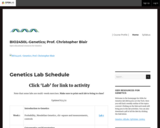
This site is an OER lab manual for a college level genetics course.
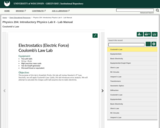
In this laboratory manual from Spring 2024, Dr. Jeremy Baron provides lab experiments for an introductory physics course. These resources include lab instructions, equipment lists, objectives, background theory, procedures, experiment instructions, and data analysis instructions/prompts all created by Dr. Baron.
Experiments include: Coulomb's Law; Equipotentials; Basic Electricity; Ohm's Law; RC Circuits; Ampere's Law; Transformers; Geometric Optics; Diffraction
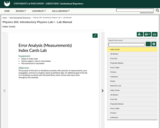
In this laboratory manual from Spring 2024, Dr. Jeremy Baron provides lab experiments for an introductory physics course. These resources include lab instructions, equipment lists, objectives, background theory, procedures, experiment instructions, and data analysis instructions/prompts all created by Dr. Baron.
Index Cards; 1D Motion; Free Fall; Projectile Motion; Force Table; Friction; Collisions; Fluids; Ideal Gas Law

This laboratory manual was developed for a microbiology laboratory course designed to give students in the health care professions basic knowledge and skills of the techniques used to study microbes. The course is taken by first-time college students in the 6-year medical program and by prepharmacy undergraduates. Because this is the only microbiology laboratory course these students take, the laboratory experiments are essential to illustrate microbiological principles and methods presented in lecture companion course. The laboratory exercises demonstrate basic concepts of microbiology with emphasis on infectious diseases and host defenses.
Throughout the course, students gain competency in the following areas:
Safe handling of microbes
Knowledge of the techniques and media used to subculture microbes
Use of the light microscope
Staining techniques
Quantitative methods
Identification of microbes using biochemical tests and/or immunological techniques
Interpretation of experimental results
In the past, I supplemented a commercially published lab manual with detailed weekly instructions posted to the course website. My instructions summarized the theory presented, pointing out the important concepts. Based on past experience, I made changes to the lab procedure accommodating organisms that work well in the UMKC teaching lab. In addition, the instructions gave students clarification on the post lab questions, encouraging critical thinking and evaluation of their actual experimental results. Students were required to use both the manual and my handouts to fully understand the exercise. As much as I tried to make each week’s activities clear, there was often confusion about the procedure, observations and/or expectations on the post-lab questions. This work aims to put it all together in one place for the student. For this project, I have built upon much of my original supplementary material using several open educational resources, most notably, OpenStax Microbiology. I appreciate the funding and support from the UM-system and the UMKC Libraries. I am grateful to my students who make teaching fun and interesting and will be unwitting editors and evaluators of this work. Sincerely,
Loretta Sanderson Klamm
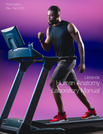
Human Anatomy Laboratory Manual is a diagram-based lab manual for 1-semester Human Anatomy courses. Included are over 100 openly-licensed images that students will be able to label and learn from.
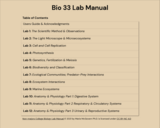
A lab manual for BIO 3300, Biology for non-majors, at Kingsborough Community College.
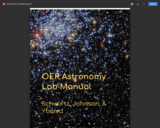
Open source astronomy lab manual, including 21 labs, 6 instructor manuals, a sample lab report, and a sample lab grading rubric. Intended for 100-level non-majors astronomy lab courses, but can also be used with modifications at other levels.
Google Docs: https://bit.ly/Astronomy-Lab-Manual
PDF: https://bit.ly/Astronomy-Lab-Manual-PDF
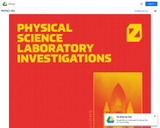
Lab manual for Introduction to Physics. This course is an introduction to the major concepts in physics, filled with relevant information of our scientific and technological age that every voting member of our society should know. We will cover both classical and modern physics; including physical principles concerning motion, gravity, heat, light, sound, electricity, magnetism, the atom, the nucleus, relativity, and quantum mechanics.
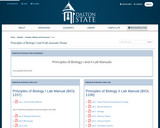
Principles of Biology I & II Lab Manuals in pdf format. 13 labs per manual ranging from the scientific method, microscopy, cells, mitosis, nervous, circulatory system, and more.